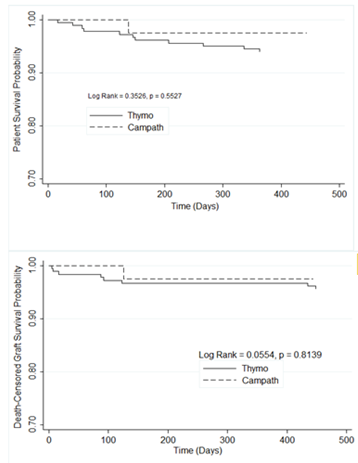Does Choice of Induction Agent Affect Outcomes in Kidney Transplants from Deceased Donors with Acute Kidney Injury and Prolonged Cold Ischemia Time?
Nephrology, Columbia University Medical Center, New York, NY
Meeting: 2017 American Transplant Congress
Abstract number: B173
Keywords: Cadaveric organs, Induction therapy, Kidney transplantation, Outcome
Session Information
Session Name: Poster Session B: Kidney Immunosuppression: Induction Therapy
Session Type: Poster Session
Date: Sunday, April 30, 2017
Session Time: 6:00pm-7:00pm
 Presentation Time: 6:00pm-7:00pm
Presentation Time: 6:00pm-7:00pm
Location: Hall D1
Kidneys with acute kidney injury (AKI) have a higher rate of DGF but similar outcomes to kidneys without AKI, although most data are with kidneys with < 30 hr cold ischemia time (CIT). Longer CIT is associated with a higher rate of DGF and may increase the risk of graft failure. It is unknown how long CIT with donor AKI impacts outcomes after kidney transplant (KT), and whether outcomes are affected by choice of induction agent.
Methods: Single-center analysis of all from 1/1/05-12/31/-15 with CIT ≥ 30 h and donor terminal creatinine (Cr) ≥ 2.0. During this time our regimen changed from thymoglobulin (rATG) to Campath (C). We compared outcomes between induction agents.
Results: 220 patients were included in the analysis. Mean follow up was longer with rATG. Recipient demographics and renal function are shown in table 1.
| RATG | C | p-value | |
| N | 180 | 40 | |
| Age (y) | 52.1±13.4 | 51.2±13.9 | 0.71 |
| Female (%) | 61.7 | 57.5 | 0.62 |
| Diabetic (%) | 31.1 | 15 | 0.04 |
| Retransplant (%) | 10.6 | 20 | 0.1 |
| DGF (%) | 65.6 | 67.5 | 0.81 |
| Donor creatinine | 3.3±1.3 | 3.9±1.9 | 0.04 |
| CIT | 39.6±5.7 | 40.6±4.8 | 0.33 |
| Cr 1-mo | 2.4±1.2 | 3.0±1.8 | 0.07 |
| Cr 6-mo | 1.8±1.7 | 1.8±0.7 | 0.65 |
| Cr 12-mo | 1.7±0.7 | 1.7±0.7 | 0.87 |
 There was no difference in patient survival or death censored graft survival between rATG and C. Acute rejections in the 1st year were higher with C (45% vs. 21.1%, p=0.004).
There was no difference in patient survival or death censored graft survival between rATG and C. Acute rejections in the 1st year were higher with C (45% vs. 21.1%, p=0.004).
Conclusions: Despite the high rate of DGF, KT from donors with AKI and prolonged CIT have good graft survival in the short-term, with renal function that continues to improve out to 1 year. Induction with C was associated with a higher rate of early acute rejection, though there was no impact on patient or graft survival when compared with rATG.
CITATION INFORMATION: Dube G, Mohan S, Chiles M. Does Choice of Induction Agent Affect Outcomes in Kidney Transplants from Deceased Donors with Acute Kidney Injury and Prolonged Cold Ischemia Time? Am J Transplant. 2017;17 (suppl 3).
To cite this abstract in AMA style:
Dube G, Mohan S, Chiles M. Does Choice of Induction Agent Affect Outcomes in Kidney Transplants from Deceased Donors with Acute Kidney Injury and Prolonged Cold Ischemia Time? [abstract]. Am J Transplant. 2017; 17 (suppl 3). https://atcmeetingabstracts.com/abstract/does-choice-of-induction-agent-affect-outcomes-in-kidney-transplants-from-deceased-donors-with-acute-kidney-injury-and-prolonged-cold-ischemia-time/. Accessed February 23, 2026.« Back to 2017 American Transplant Congress
